#Serbian revolution
Text
◾Original portraits of some of the Serbian revolutionaries from the 18th and 19th centuries by Serbian painter Urosh Knezhevitsh(srb. Урош Кнежевић/lat. Uroš Knežević) 🇷🇸
◾Officially, the first revolution for liberation from the Ottoman Empire in the Balkans was started by the Serbs in 1804 (and earlier than that there were smaller Serbian revolutions).
▪️Hayduk Velyko Petrovitsh & Mirko Apostolovitsh (srb. Хајдук Вељко Петровић и Мирко Апостоловић)
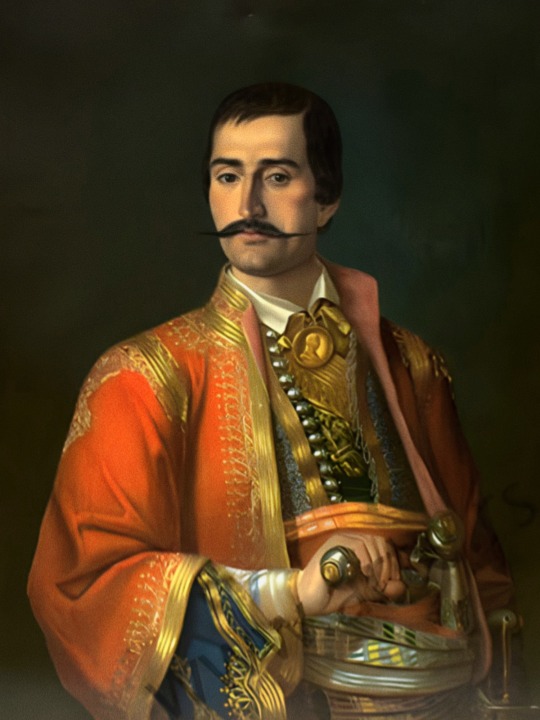
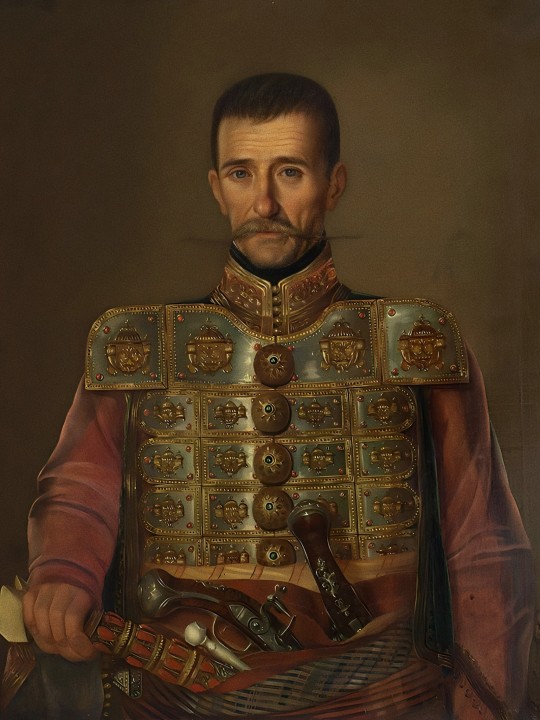
▪️Voivoda Blagoye Zhabarats & Yanko Popovitsh (srb. Војвода Благоје Жабарац и Јанко Поповић)

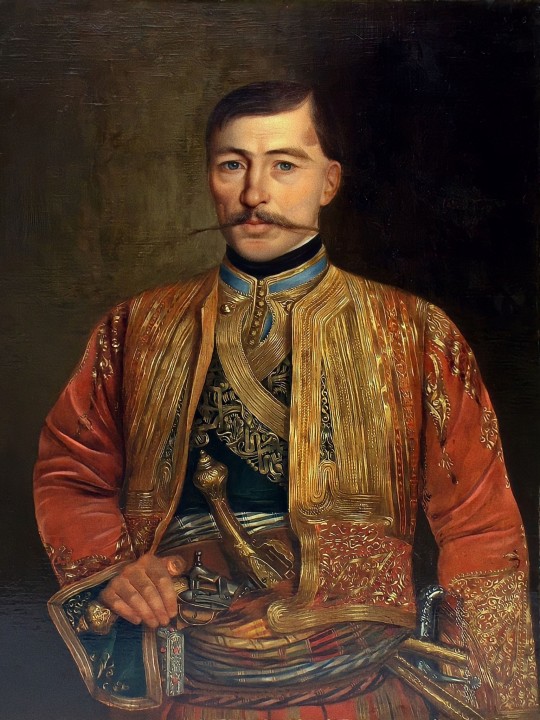
▪️Vasa Charapitsh & Yanitshie Dyuritsh(srb. Васа Чарапић и Јанићије Ђурић)

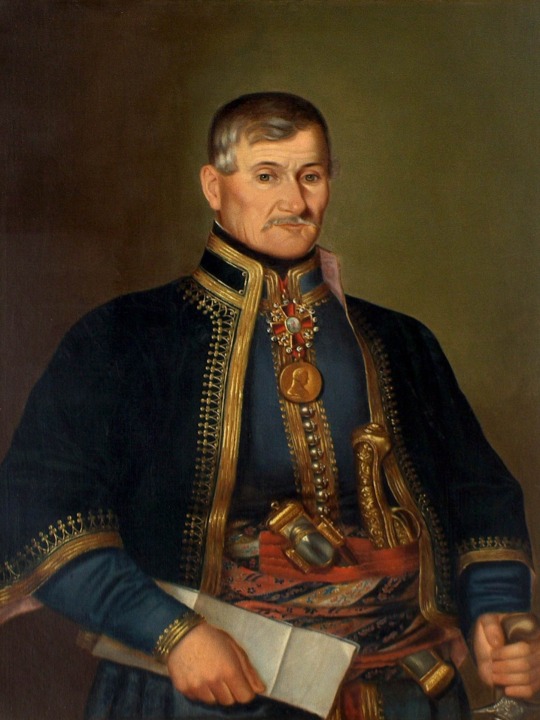
▪️Luka Lazarevitsh & Mladen Milovanovitsh(srb. Лазар Лазаревић и Младен Миловановић)
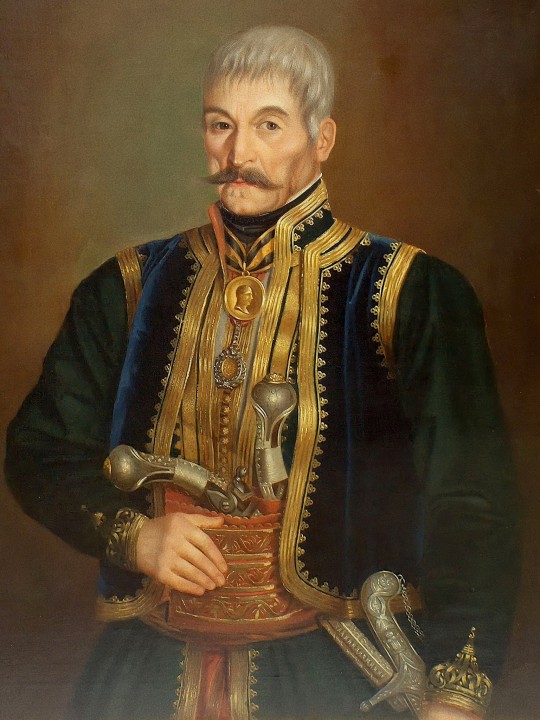

▪️Yakov & Aleksa Nenadovitsh (srb. Јаков и Алекса Ненадовић)
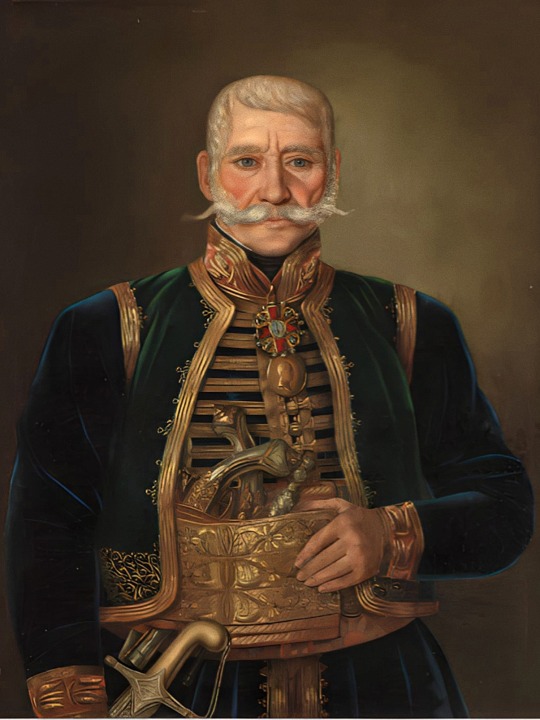

#serbian#balkan#europe#serbian traditional clothes#serbian folklor#Serbian warriors#Voivodas#Serbian revolutionaries#Serbian revolution#18th century#19th century#Dinaric#Phenotype#Vasa Čarapić#Mirko Apostolović#Hajduk Veljko Petrović#Blagoje Žabarac#Janko Popović#Janićije Đurić#Prvi srpski ustanak#1804#South slavs
62 notes
·
View notes
Link
Padom režima Slobodana Miloševića, 5. oktobra 2000. godine i dolaskom na vlast nekadašnjeg DOS-a, na čelu sa ubijenim premijerom Zoranom Đinđićem, došlo je i do otvaranja medija, deset godina zarobljenih brutalnim i zločinačkim režimom svrgnutog diktatora.
Govoreći o tome koliko je u Srbiji urađeno za godinu dana od kada je Slobodan Milošević skinut sa vlasti, Zoran Đinđić je naveo da je ostvaren ogroman napredak društva.
„To je kilometarski pomak. Ali ako pokušamo da uporedimo sa dolazećim periodom, urađeno je premalo. Ljudi se nadaju nečemu što treba da dođe i odnosu na ovo što se dešava je milimetarski pomak. Važno je i to što smo deblokirali društvo, ono sada slobodno misli, razmišlja, kritikuje – ljudi daju neke ideje.
To što tih ideja i ljudi sa pozitivnim rezultatima nema više je realno stanje društva. Ali nikome nije zabranjeno da kaže. To je početak normalne cirkulacije pozitivne energije kroz naše društvo. Trenutno je ono što se dešava u Srbiji – realističan presek našeg stanja – takvi smo kakva nam je trenutno Srbija. Ali niko ne može da kaže da su najbolji potisnuti, a da su najgori gore. To je dobra startna pozicija za narednih deset godina“
***To neće biti miting, biće strašni sud - 1. oktobra 2001. god
„Postao sam svestan da Vojska Jugoslavije neće reagovati tek 11. oktobra 2000. godine. Do tada nije bilo sigurno da li smo pobedili ili ne“, kazao je Đinđić i nastavio: „Problem je bio što smo na predsedničkim izborima pobedili, ali zbog federalnih izbora i bojkota crnogorskih stranaka, nismo imali većinu u saveznom parlamentu. Bilo je nejasno da li možemo da napravimo koaliciju za vladu, jer je bilo logično da je naprave Socijalistička partija Srbije i crnogorska Socijalistička narodna partija. Drugi problem je bio u tome što smo dobijali jugoslovenskog predsednika, ali su policija, finasije i televizija ostale na republičkom nivou, što je značilo da će se stvari vrlo brzo vratiti u stare kolotečine. Ne samo da ne bismo pobedili, već bismo i nastradali“.
Prelomni trenutak, prema oceni Đinđića, je bio kada je tadašnji predsednik Srbije Milan Milutinović, uz predhodni dogovor i saglasnost SPS, pristao da raspiše prevremene izbore u Srbiji.
„Do tada je sve bilo na ivici noža“, naveo je Đinđić.
Ključni trenutak tog 5. oktobra 2000. godine za Đinđića je, kako je naveo, bio ulazak u savezni parlament, a u organizacionom smislu – saznanje da specijalne jedinice neće intervenisati.
„To su bili neki dnevni događaji koji su davali nadu da će se stvar uspešno završiti. Međutim, tek kada su raspisani prevremeni izbori na republičkom nivou znao sam da definitivno pobeđujemo“, rekao je Zoran Đinđić, lider Demokratske stranke i ondašnji predsednik Vlade Srbije.
Đinđić 4. oktobra u ponoć dobio poziv iz gradskog MUP-a
Dok su čekali rasplet situacije nakon izbora, Đinđić je ispričao situaciju kada je 4. oktobra u ponoć dobio poziv iz gradskog MUP-a.
„Nisam siguran da li je to bio šef Branko Đurić ili neko drugi i tražio je mene. Javio sam se i on mi je rekao: „vi ste za sutra zakazali miting ispred Savezne skupštine, organizator ste i odgovorni ste za to“. Bio sam zbunjem i rekao sam mu da ne znam o čemu priča, ali je on nastavio da priča kako sutra treba da se postavi bina ispred parlamenta, da je skup zabranjen i da možemo da ga održimo ili na Trgu Republike ili na Ušću. Dodao je da ću za sve posledice nepoštovanja te odluke snositi odgovornost jer sam se u to vreme potpisivao kao menadžer kampanje DOS. Rekao sam mu da neće biti velikog mitinga i da je sve pogrešno razumeo. Onda me je pitao šta će se to sutra dogoditi, a ja sam mu rekao: „Sutra će biti strašni sud“.“Pa dobro, onda idem da spavam“, odgovorio mi je i slustio slušalicu““, prisećao se Đinđić tog razgovora.
Iz ovoga je Zoran Đinđić zaključio koliko je policija, kako je naveo, neralano procenila dešavanja:
„Mislili su da će se skupiti 100.000 ljudi da će biti malo govora, zviždanja i da će se posle toga ljudi razići po gradu i nikom – ništa“.
Masovnim demonstracijama više stotina hiljada ljudi u gradovima širom zemlje koje su dovele do potpunog rušenja režima Slobodana Miloševića, građani Srbije izborili su se za početak gradnje demokratskog društva.
„Uradili smo ono što smo morali, a svaka greška ili neodlučnost mogla je da nas košta života“
Tog 5. oktobra 2000. godine, simboličnim upadom u Narodnu skupštinu, građani su zaštitili svoju izbornu volju i potvrdili pobedu Demokratske opozicije Srbije.
Na pitanje da li bi na isti način postupili i danas – godinu dana kasnije, Đinđić je potvrdno odgovorio, dodajući da je sve izvedeno u „jednom manevarskom prostoru u dva kvadratna cenimetra, bez mogućnosti izbora“.
„Uradili smo ono što smo morali, a svaka greška ili neodlučnost mogla je da nas košta života“, rekao je on.
Samo dve godine nakon ovog intervjua, Zoran Đinđić je ubijen. To se dogodilo 12. marta 2003. godine, ipred ulaza u zgradu Vlade Srbije. Na Đinđića je iz zgrade u Ulici admirala Geprata 14, pucao pripadnik JSO Zvezdan Jovanović, koji je kao i bivši komandant JSO Milorad Ulemek Legija, osuđen pred Specijalnim sudom na 40 godina zatvora. Presudu je potvrdio i Vrhovni sud Srbije 29. decembra 2008. godine.
#Peti oktobar#zoran đinđić#beograd#srbija#revolution#belgrade#serbia#Danas#history#politics#serbian history#mu text#mu history#Nek bulevari sveta pamte muziku tvojih koraka#sledimo viziju je floskula sa postera#nažalost...
2 notes
·
View notes
Text
Serbian Entree
SERBIAN PLJESKAVICA
(Serbian Burger)
INGREDIENTS
1 garlic clove
1 large onion (1 small one later)
2 tablespoons olive oil or vegetable oil
1 pound ground beef
¾ pound ground pork
1 teaspoon Spanish paprika or paprika
no-stick spray
8 pita loaves*
some kajmak** (optional)
some ajvar*** (optional)
1 green onion
1 small onion
your favorite condiments.****
* = Lepinje buns are…

View On WordPress
#ajvar#burger#China#entree#folk tunes#ground beef#ground pork#kajmak#lepinje#milk truck#olive oil#pita loaves#pljesjavica#revolution#Serbian
0 notes
Text
[...]
A long time ago, while conducting research for my master’s thesis on how the economic reforms of [French President] Emmanuel Macron had closed the circle started by [François] Mitterrand, I came to realize that the old Thatcherite idea, “There is no society, only individuals with the freedom of choice,” had become so commonly accepted in contemporary society that both right– and left-wing neoliberals today feel no need to emphasize it.
Social surveys have also found a shocking lack of empathy and solidarity among communities in the U.S. and Western Europe, exactly at the time the dominant political narratives have begun to insist on inclusiveness and tolerance toward others. Subtle distinctions in definitions can often reveal commonly understood and yet unspoken differences between terms that we prefer to use: Inclusiveness does not necessary oblige solidarity or empathy, just as tolerance in the absolute sense means merely withholding action based on existing animosities, which are acknowledged by the very need for the usage of the term in question. Tolerance, indeed, does not have to mean understanding and accepting increasingly distant “others.”
A question must be asked: Are we now, through ideological terminology, searching for exactly those things that we are in fact missing in our social reality? The need to define ideological terms prompts this question in that it arises only when certain notions have left the sphere of unspoken social consensus—the very frame of political and social thought.
In his latest book, The exiled terms, Todor Kuljić, who is among the most internationally recognized Serbian sociologists of the previous and current century, explains how four decades of neoliberal reforms have influenced significant changes in the language we use to discuss ideology and politics, noting that all the terms previously connected to class inequalities, Marxist ideologies, and collective struggles of the working class have been systematically replaced with less critical, less “communist sounding” terms.
In sociology curricula, the terms “exploitation,” “revolution,” and even “humanism” have been almost completely forsaken, while we can see increased usage of words such as “transition,” “transformation,” and “social exclusion.” The term “transition,” a case in point, normalises poverty and corruption in countries that need to be convinced that they will be much better off when they adopt neoliberal economic models.
The famous comedian George Carlin put forward a notion that there is a cultural tradition in the United States of constantly inventing new terms, and “exiling” the old-fashioned terms, which derives from the constant need to make the brutalities of everyday life more easily accommodated. “Americans have trouble facing the truth,” Carlin once said, “so they invent a kind of soft language to protect themselves from it.” If poor people used to live in slums, to cite one of Carlin’s standup routines, “now ‘the economically disadvantaged’ occupy ‘substandard housing’ in ‘inner cities.’”
Anthropological studies have shown that this tendency has certain connections with the totemistic belief of the earliest human societies that, by changing the way we verbally identify a certain aspect of reality we can change the reality itself. It appears that this has never been more relevant than in the case of the modern culture of political correctness, which proposes that we accept social problems as consequences of our subconscious thoughts and/or individual actions, and try to solve them by changing the language we use to define them—while never searching for their material causes.
Professor Jordan Peterson has claimed that modern-day political culture developed in a manner in which the previously presumed need for objectivity was replaced with subjective feelings and perceptions, while the very understanding of material reality has been, through relativization, reduced to little more than an inconvenience that can be regulated by state legislation and group stigmatization. On the other hand, Slavoj Žižek holds that it is precisely the abandonment of the collective (ideas) for the individual (interests) that has led our increasingly globalized political culture down this path. The neoliberal, postmodern left has merely followed the neoliberal right of the eighties in the project of eliminating undesirable terminology related to physical, class, and social reality—depending on the preference of each—from the common frames of political debate, since a consensus on understanding material reality is the first and necessary condition of the collective political struggle.
Žižek also claims that the phenomenon of New Age leftists striving toward zealous political correctness merely contributes to depriving formal and informal human relationships of what is the very essence of humanity. This is because following the increasingly strict standards of Newspeak, as Orwell would put it, necessarily increases the distance between people by making them focus on their differences, thus continuously reinforcing the same barriers neoliberal leftists wish to break free of, while, at the same time, leaving them unable to overcome the tensions of every-day interactions through humor and other forms of releasing the burdening contents of the individual and collective subconscious.
Further, if we take into account the previously mentioned thesis of Professor Kuljić, we can also propose the question: To what extent is the modern neoliberal leftist obsession with political correctness a consequence of the absence of a language and terminology by which young people could articulate the actual causes of their fear and anger and the need to express political radicalism? Of course, leftists of this persuasion remain thoroughly within the existing frame of the globally dominant ideology and never challenge the economic and political system.
At the same time, neoliberal right-wing policies continue to insist on the previously discussed narrative of personal responsibility—or, rather, personal “guilt”—not for the problems of cultural inequalities, which their leftist counterparts remain unable to relate to their actual causes in material reality, but rather for the position of the individual in the new economic order. Now in social media we witness the rise of an entire generation of young conservatives who present success and failure in life—mostly defined by the acquisition of wealth rather than personal happiness—as a consequence of individual decisions and actions, entirely decontextualized and removed from one’s personal circumstances, class background, and social context.
Unlike the previous authors of the self-help books from the early eighties, these new “life coaches” of the internet are heavily engaged in the relativization of ethics, with some going as far as to conclude that those who stay employed in times of low wages and worsening labor conditions, instead of risking their financial existence with private business gambles, have no one but themselves to blame for being exploited. Thus, in a perverted sense of logical framing, they arrive very close to an argument used by ancient Greek philosophers to justify slavery: “An Athenian would rather kill himself than become a slave.”
Neoliberal leftists legitimize the unfair treatment of others for personal gain with the condition that you address respectfully the same people whom you are exploiting—and, as well, disregard solidarity as the core value of the left. Contrarily, the neoliberal right wing insists that participation in the hierarchy of social and economic power is a goal necessary to achieve and a matter of personal choice, and not at all of social reality. It is as though they, the neoliberal right wing, have forgotten with how much effort traditional conservatives tried to uphold the principles of ethics—even if many of those principles were not part of the initial humanist–Enlightenment agenda, or universal values as Immanuel Kant would define them, but served only to preserve position and ensure reproduction of the upper classes—as though there truly was no society anymore.
Not even the Prussian militarists of the old German Empire ever went so far as to assert openly that there is no common good, not even a universal moral code, and that, rather, you should seek to enrich yourself at the expense of others just to prove your own capabilities to a society you don’t even believe in anymore. But modern-day conservatives have crossed this line by seducing today’s ever more fearful youth with the promises that, if they prove capable enough, they can assume the role of the oppressor themselves and exploit the weak, who deserve their fate for failing to seize the “boundless opportunities” of some neoliberal economic paradise.
Thus, prevalent neoliberal left– and right-wing ideologies have not just disregarded, fragmented, or redefined traditionally universalist principles of ethics; they have also forsaken many “core values”—an emphasis on collective solidarity or personal liberty, common wellbeing, or individual morality—which defined the differences between the significant left– and right-wing ideologies of the previous two centuries. Even more important, humanity has been almost completely exiled from the sphere of ideological priorities—in favor of politically correct formality in the case of the New Age left, or, in the case of the New Age right, in favor of a convenient indifference to social problems. The value of humanity, in the sense in which it was understood during the course of the 20th century, will therefore have a hard time finding its way back into the ideological frames of the new world order.
Luka Filipović, among the youngest Serbians ever to earn his doctorate, holds a Ph.D. awarded by the Faculty of Philosophy at the University of Belgrade. He has published numerous articles regarding the history of labor movements, communist parties, neoliberal economic reforms, and political turmoil of the late 20th century in Europe and Serbia. His book, Eurokomunizam i Jugoslavija 1968-1980,(Eurocommunism and Yugoslavia 1968–1980), is published this month by the Institute for Contemporary History in Belgrade, where Filipović currently conducts his research.
19 notes
·
View notes
Text
andri's 2024 serbian epic poetry challenge
it really is a shame that the majority of the translations aren't easily available online, and that almost all translations are from the kosovo cycle, but here we are and i think you might find some of these interesting. serbian epic poetry is a part of serbian oral tradition; these are poems mostly composed by unknown authors and are traditionally recited by guslari. the majority of the songs have been collected during the later half of the 18th and first half of the 19th century by verious different chroniclers, such as the brothers grimm, with vuk stefanović karadžić making great efforts to collect and catalogue all of them. they are divided into cycles: non-historic cycle (poems about slavic mythology), pre-kosovo cycle (poems about events that predate the battle of kosovo), kosovo cycle (poems about events that happened just before and after the battle of kosovo), post-kosovo cycle (poems about post-battle events), cycle of kraljević marko, and cycle of hajduks and uskoks (the last cycle being actively recorded by vuk who participated in the serbian revolution).
linked here below are songs that belong to the kosovo and the cycle of marko kraljević with the adition of the begining of the revolt against the dahias, which belongs to the last cycle and is written by filip višnjić, the most famous guslar (usually the poems were distributed anonymously and each guslar would rewrite or ad onto a song during his preformance). i will try to update this list as much as i can, but the translations are rare in english (if you know german, look for german translations collected by brothers grimm)
ban strahin (pre-kosovo cycle)
prince marko and the vila
the death of mother of yugovichi
the miracle of tsar lazar
marko kraljević and the eagle
the building of ravanitsa
the downfall of the kingdom of serbia
tsar lazar and tsaritsa militsa
musich stefan
the building of skadar (this one is aslo pre-kosovo cycle)
the kosovo maiden
tsaritsa militsa and voyvoda vladeta
the supper in krushevats
captain milosh and ivan kosanchich
death of voyvoda prijezda (for some reason one of my personal favourites)
the begining of the revolt against the dahias
that's what i managed to find so far but i find more i will link them here. pick either one of these and have fun, and if you want to you can let me know how you like them. if you can read ćirilica you can find a lot of the songs in serbian here. enjoy!
12 notes
·
View notes
Text

Дан државности Србије / Statehood Day (Serbia)
Statehood Day (Serbian Cyrillic: Дан државности, romanized: Dan državnosti), also known as the Sretenje (Serbian Cyrillic: Сретење), is a holiday celebrated every 15 February in Serbia to commemorate the outbreak of the First Serbian Uprising in 1804, which evolved into the Serbian Revolution against Ottoman rule. On the same day in 1835, the first modern Serbian constitution was known as the "Sretenje Constitution" or "Candlemas Constitution".
Statehood Day is a public national holiday, and official celebrations last for two days, every 15 February.
#serbia#srbija#dan drzavnosti#republika srbija#serbian#serbs#srbi#srpski#sprska zastava#србија#срби#српски#Statehood Day#google
9 notes
·
View notes
Text
thinking about that scene from bbc sherlock where sherlock was being tortured in an evil serbian dungeon prison naturally by a bloke with The most comically botched serbian pronunciation and then mycroft showed up to save him disguised as one of the serbian torturers which for some reason meant he looked like a russian soldier from the october revolution. like what was all of that. literally so haunting
233 notes
·
View notes
Text
From 2015.
Excerpted from Blueprint for Revolution: How to Use Rice Pudding, Lego Men, and Other Nonviolent Techniques to Galvanize Communities, Overthrow Dictators, or Simply Change the World, by Srdja Popovic. Out now by Spiegel & Grau.
It was early on in our efforts to take down Slobodan Milosevic, and like all novice activists, we had a moment of reckoning. Looking around the room at one of our meetings, we realized that we were a bunch of Serbian kids, and rather than focus on what we had going for us, we began obsessing about everything we didn’t have. We didn’t have an army. We didn’t have a lot of money. We had no access to media, which was virtually all state-run. The dictator, we realized, had both a vision and the means to make it come true; his means involved instilling fear. We had a much better vision, but we thought on that grim evening, no way of turning it into a reality.
It was then that we came up with the smiling barrel.
The idea was really very simple. As we chatted, someone kept talking about how Milosevic only won because he made people afraid, and someone else said that the only thing that could trump fear was laughter. It was one of the wisest things I’ve ever heard. As Monty Python skits have always been up there right with Tolkien for me, I knew very well that humor doesn’t just make you chuckle—it makes you think. We started telling jokes. Within an hour, it seemed to us entirely possible that all we really needed to bring down the regime were a few healthy laughs. And we were eager to start laughing.
We retrieved an old and battered barrel from a nearby construction site and delivered it to our movement’s “official” designer—my best friend, Duda, a designer—and asked him to draw a realistic portrait of the fearsome leader’s face. Duda was delighted to help. When we came back a day or two later, we had ourselves Milosevic-on-a-barrel, grinning an evil grin, his forehead marked by the barrel’s numerous rust spots. It was a face so comical that even a 2-year-old would have found it amusing. But we weren’t done. We asked Duda to paint a big, pretty sign that read “Smash his face for just a dinar.” That was about two cents at the time, so it was a pretty good deal. Then we took the sign, the barrel, and a baseball bat to Knez Mihailova Street, the main pedestrian boulevard in Belgrade. Right off Republic Square, Knez Mihailova Street is always filled with shoppers and strollers, as this is where everyone comes to check out the latest fashions and meet their friends for drinks in the afternoons. We placed the barrel and the sign smack in the middle of the street—right at the center of all the action—and hastily retreated to, the Russian Emperor, a nearby coffee shop, to watch.
The first few passersby who noticed the barrel and the sign seemed confused, unsure what to make of the brazen display of dissidence right there in the open. The following 10 people who checked it out were more relaxed; some even smiled, and one went as far as picking up the bat and holding it for a few moments before putting it down and quickly walking away. Then, the moment we’d been waiting for: A young man, just a few years younger than us, laughed out loud, searched his pockets, took out a dinar, plopped it into a hole on top of the barrel, picked up the bat, and with a gigantic swing smashed Milosevic in the face. You could hear the solid thud reverberate five blocks in each direction. He must have realized that with the few remaining independent radio and newspapers of Belgrade criticizing the government all the time, one dent in a barrel wasn’t going to land him in prison. To him, the risk of action was acceptably low. And once he took his first crack at Milosevic’s face, others started to realize that they too could get away with it. It was something between peer pressure and a mob mentality. Soon curious bystanders lined up for a turn at bat and took their own swings. People started to stare, then to point, then to laugh. Before long some parents were encouraging their children who were too small for the bat to kick the barrel instead with their tiny legs. Everybody was having fun, and the sound of this barrel being smashed was echoing all the way down to Kalemegdan Park. It didn’t take long for dinars to pour into the barrel and for poor Duda’s artistic masterpiece—the stern and serious mug of Mr. Milosevic—to get beaten into unrecognizability by an enthusiastic and cheerful crowd.
As this was happening, my friends and I were sitting outside at the café, sipping double espressos, smoking Marlboros, and cracking up. It was fun to see all these people blowing off steam with our barrel. But the best part lay ahead.
It came when the police arrived. It took 10 or 15 minutes. A patrol car stopped nearby and two pudgy policemen stepped out and surveyed the scene. This is when I came up with my beloved “Pretend Police” game. I played it for the first time at the café that day. The police’s first instinct, I knew, would be to arrest people. Ordinarily, of course, they’d arrest the demonstration’s organizers, but we were nowhere to be found. That left the officers with only two choices. They could arrest the people lining up to smack the barrel—including waiters from nearby cafés, good-looking girls holding shopping bags, and a bunch of parents with children—or they could confiscate the barrel itself. If they went for the people, they would cause an outrage, as there’s hardly a law on the books prohibiting violence against rusty metal cylinders, and mass arrests of innocent bystanders is the surest way for a regime to radicalize even its previously pacified citizens.
Which left only one viable choice: Arrest the barrel. Within minutes of their arrival, the two rotund officers shooed away the onlookers, positioned themselves on either side of the filthy thing, and hauled it off in their squad car. Another friend of ours, a photographer from a small students’ newspaper, was on hand to shoot this spectacle. The next day, we made sure to disseminate his photographs far and wide. Our stunt ended up on the cover of two opposition newspapers, the type of publicity that you literally couldn’t buy. That picture was truly worth a 1,000 words: It told anyone who so much as glimpsed at it that Milosevic’s feared police really only consisted of a bunch of comically inept dweebs.
Of course, this was just the beginning. Over the next six years, my friends and I built Otpor—Serbian for resistance—a nonviolent social movement that challenged Milosevic’s regime, stripped it of its legitimacy, and led to its downfall. But it began by chipping away at the people’s fear. It began with a joke.
Today my colleagues and I help train nonviolent democratic movements around the world, and the barrel story is one of the first stories we share with aspiring activists. And, without fail, every time people hear about it they say more or less what my Egyptian friends did when we walked them through Republic Square. “It’ll never work back where I’m from.” But I remind my new friends that while humor varies from country to country, the need to laugh is universal. I’ve noticed this as I’ve traveled to meet with activists around the world. People from Western Sahara or Papua New Guinea may not agree with me on what exactly makes something funny—for more on this check out any German “comedy”—but everyone agrees that funny trumps fearsome anytime. Good activists, like good stand-up comedians, just need to practice their craft.
4 notes
·
View notes
Text
//Riot’s characterisation of current Zaun itself is a mix of... not good stuff.
It used to be a tongue-in-cheek representation of Germany, UK and eastern/southern Slavic countries and their attitudes (look at the names, accents, area names, you can clearly see German, Polish, British names). Industrial, vulgar, cynical.
But now it’s just American, aping a really bad and stereotypical environment of Britain during industrial revolution. It’s filled with a really bad characterisation that’s typical for how Americans see poor areas in UK or especially London. Which baffles me, because UK is not some god forsaken unknown country with obscure culture (like Serbia would be as an example!) just look at how they do their own TV shows and movies? I’d understand mixing up Czech and Serbian, but to continuously keep using generic “poor cockney” for Zaun is just really hard to watch.
#worldbuilding#league universe#arcane#criticism#just look at stuff in LoR#or in Universe stories or Arcane#it's painful
28 notes
·
View notes
Text
Events 4.9 (after 1950)
1952 – Hugo Ballivián's government is overthrown by the Bolivian National Revolution, starting a period of agrarian reform, universal suffrage and the nationalization of tin mines
1952 – Japan Air Lines Flight 301 crashes into Mount Mihara, Izu Ōshima, Japan, killing 37.
1957 – The Suez Canal in Egypt is cleared and opens to shipping following the Suez Crisis.
1959 – Project Mercury: NASA announces the selection of the United States' first seven astronauts, whom the news media quickly dub the "Mercury Seven".
1960 – Dr. Hendrik Verwoerd, Prime Minister of South Africa and architect of apartheid, narrowly survives an assassination attempt by a white farmer, David Pratt in Johannesburg.
1967 – The first Boeing 737 (a 100 series) makes its maiden flight.
1969 – The first British-built Concorde 002 makes its maiden flight from Filton to RAF Fairford with Brian Trubshaw as the test pilot.
1980 – The Iraqi regime of Saddam Hussein kills philosopher Muhammad Baqir al-Sadr and his sister Bint al-Huda after three days of torture.
1981 – The U.S. Navy nuclear submarine USS George Washington accidentally collides with the Nissho Maru, a Japanese cargo ship, sinking it and killing two Japanese sailors.
1989 – Tbilisi massacre: An anti-Soviet peaceful demonstration and hunger strike in Tbilisi, demanding restoration of Georgian independence, is dispersed by the Soviet Army, resulting in 20 deaths and hundreds of injuries.
1990 – An IRA bombing in County Down, Northern Ireland, kills three members of the UDR.
1990 – The Sahtu Dene and Metis Comprehensive Land Claim Agreement is signed for 180,000 square kilometres (69,000 sq mi) in the Mackenzie Valley of the western Arctic.
1990 – An Embraer EMB 120 Brasilia collides in mid-air with a Cessna 172 over Gadsden, Alabama, killing both of the Cessna's occupants.
1991 – Georgia declares independence from the Soviet Union.
1992 – A U.S. Federal Court finds former Panamanian dictator Manuel Noriega guilty of drug and racketeering charges. He is sentenced to 30 years in prison.
1994 – Space Shuttle program: Space Shuttle Endeavour is launched on STS-59.
2003 – Iraq War: Baghdad falls to American forces.
2009 – In Tbilisi, Georgia, up to 60,000 people protest against the government of Mikheil Saakashvili.
2013 – A 6.1–magnitude earthquake strikes Iran killing 32 people and injuring over 850 people.
2013 – At least 13 people are killed and another three injured after a man goes on a spree shooting in the Serbian village of Velika Ivanča.
2014 – A student stabs 20 people at Franklin Regional High School in Murrysville, Pennsylvania.
2017 – The Palm Sunday church bombings at Coptic churches in Tanta and Alexandria, Egypt, take place.
2017 – After refusing to give up his seat on an overbooked United Express flight, Dr. David Dao Duy Anh is forcibly dragged off the flight by aviation security officers, leading to major criticism of United Airlines.
2021 – Burmese military and security forces commit the Bago massacre, during which at least 82 civilians are killed.
1 note
·
View note
Text
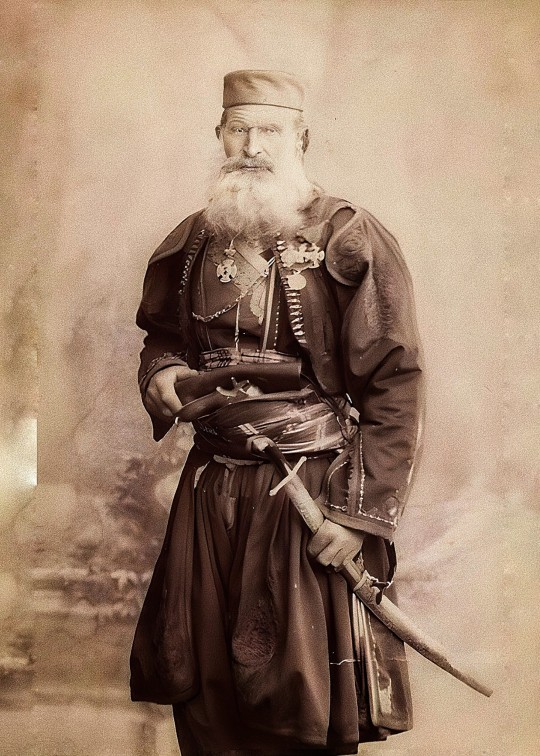
◾Bogdan Zimonyitsh (Serbian Cyrillic: Богдан Зимоњић; 1813 – 21 January 1909) was a Serbian Orthodox priest and Vojvoda (military commander) in two major uprisings against the Ottoman Empire in 19th-century Herzegovina: in 1852–62, and 1875–78. He is mentioned in archival sources along with other Serbian freedom-fighting priests, including Jovitsa Ilitsh(srb. Јовица Илић/lat. Jovica Ilić) and his associates Pavle Tvrtkovitsh(srb. Павле Твртковић/lat. Pavle Tvrtković), Mile Vitkovitsh(srb. Миле Витковић/lat. Mile Vitković), and Stevan Avramovitsh(srb. Стеван Аврамовић/lat. Stevan Avramović) who rebelled against the occupiers, and another priest, Petko Yagoditsh(srb. Петко Јагодић/lat. Petko Jagodić) of Shamac, who led the next revolt, while history records further armed clashes led by priests Mile Chulibrk(srb. Миле Чулибрк/lat. Mile Čulibrk), Marko Popovitsh(srb. Марко Поповић/lat. Marko Popović), Vaso Kovachevitsh(srb. Васо Ковачевић/lat. Vaso Kovačević) and Gatshina(srb. Гаћина/lat. Gaćina).
◾His son Petar Zimonyitsh(srb. Петар Зимоњић/lat. Petar Zimonjić), the metropolitan of Dabar-Bosnia, was killed by the Ustaše regime in the Independent State of Croatia in June 1941.
#Bogdan Zimonjić#serbian#balkan#europe#serbian traditional clothes#serbian folklor#slavic#Serbian man#Serbian men#Serb#Orthodox#Serbian Orthodox#Priest#Revolution#Serbian revolution#Herzegovina#Serbian culture
22 notes
·
View notes
Text

I suspect people miss my header image and assume its a Greek temple. If you look at the pillars for a second though, you'll see that it's very modern looking, even surreal. It is, in fact, a Serbian monument called "The Mausoleum of Struggle and Victory" from the socialist era. The aesthetic combines Modernism and Neo-Classicism. The photo itself is by Yang Xiao, as part of a series combining artificial lights with decaying socialist-era monuments at night, called "Eternal Monuments in the Dark."
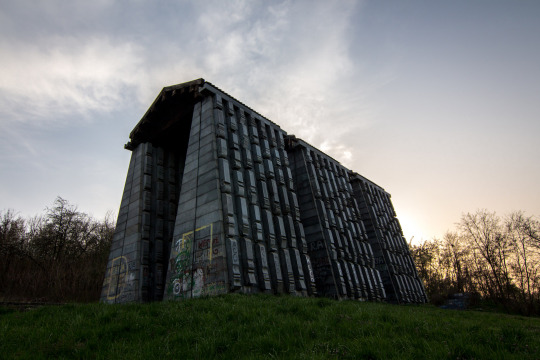
By framing socialist bloc architecture as classical ruins, and placing the democratic revolutions of Greece along side modern socialist revolutions, I'm making a point about historical narratives and associations. Ancient Mediterraneans didn't associate themselves with Northern Europeans, and to this day people are shocked by how "Eastern" Greek culture is. In many ways Islamic culture is more Roman than Western Culture. The Fascist fantasy of the past is just that: a fantasy. A tool they use for their political goals. They homogenize the diversity of Rome, they whitewash Greek statues, and they impose modern Classical music on cultures that wouldn't recognize it.
youtube
Liberals talk about how Ancient Greece is the foundation of Western Civilization™️, but they have no greater claim to it than Muslims or Buddhists. (The Greeks got around.) There is nothing in bourgeois political forms that's reminiscent of Athens, except perhaps for their hypocrisy towards their slaves. Many of the things the peasants and proletarians of Greece and Rome fought for were actively despised by Hamilton, Jefferson, and that whole lot of grifters. They hated universal male suffrage, they hated mass assemblies, they hated ballot measures, they hated rotation and sortition, and they hated land reform and debt abolition. They didn't love "the ancients," they loved their aristocrats.
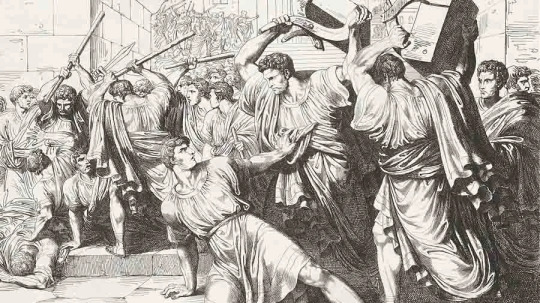
Socialists have long loved the defeated reformers and revolutionaries of the ancient past. The first modern communist called himself "Gracchus Babeuf." What I'm doing isn't special. The point is to take the things the bourgeois order claims it's built on, and show how fake it all is.
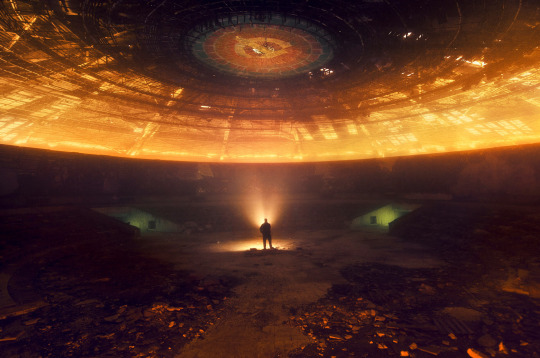
One day, the role the Classical Mediterranean plays in the modern superstructure will be replaced by the Socialist Bloc: a defeated experiment whose ruins global Communism will rest on. Their monuments, now covered in graffiti, will one day be visited by tourists the way the Parthenon is, to marvel at their glorious ambitions.
#socialism#communism#Marxism#history#Ancient Greece#Ancient Rome#architecture#historiography#Youtube#Soviet Union#Serbia
6 notes
·
View notes
Text
🌍 Mapping 13 Countries Inside Ukraine 🇺🇦: A Fascinating Thought Experiment! 🌍
Ever wondered how big Ukraine really is? Let's play a game of geopolitical Tetris! 🎮
📍 Countries Inside Ukraine's Borders 📍
🇦🇱 Albania finds its place in the Northwest, specifically in Volhynia.
Historical Note: Like Ukraine, Albania also struggled for its independence and faced various invasions.
2. 🇨🇿 Czechia snugly fits in the West, in the regions of Galicia-Podolia.
Did You Know?: Both the Czech Republic and Ukraine are Slavic countries with historical ties that span over a thousand years. They have shared moments of solidarity, especially during the Velvet Revolution and Ukraine's own struggle for democracy. The Czech civil society has often been supportive of Ukraine's European aspirations, and both nations have a rich folklore tradition.
3. 🇸🇮 Slovenia nestles in the Southwest, in Transcarpathia.
Cultural Insight: Slovenia and Ukraine share a love for mountainous landscapes.
4. 🇦🇹 Austria takes its spot in the North, covering areas like Polesia, Kyiv, and Siveria.
Historical Insight: the Austrian Empire once controlled the region of Galicia, which is now part of modern-day Ukraine. The Austrian rule has left a lasting impact on the culture and architecture of the region.
5. 🇸🇰 Slovakia finds its home right in the Center of Ukraine.
Historical Ties: Slovakia and Ukraine share a border and have a complex history of interaction.
6. 🇷🇸 Serbia is located in the Black Sea Coast and Zaporizhzhia region.
Conflict Legacy and External Influence: Both countries have recent histories of conflict and are still dealing with its aftermath. Russia often leverages shared historical narratives to influence Serbian politics, further complicating Serbia's geopolitical stance.
7. 🇲🇪 Montenegro fits into Southern Bessarabia/Budjak.
Tourism Angle: Montenegro is a tourism gem, something Ukraine is aspiring to become.
8-9. 🇨🇾 Cyprus and 🇹🇷 Northern Cyprus share the southern part of Kherson region.
Political Intrigue: The division of Cyprus into two entities echoes Ukraine's own territorial issues.
10. 🇭🇺 Hungary is situated in the East, covering Poltava region and Sloboda Ukraine.
Historical and Current Ties: Hungary ruled over Transcarpathia for centuries, a region primarily inhabited by Ukrainians. During its rule, Hungary implemented policies aimed at assimilating the local population. Even today, Hungarian politicians occasionally make territorial claims against Ukraine and other neighboring countries.
11-12. 🇮🇱 Israel and 🇵🇸 Palestine are located in the Azov Sea region.
Historical Trauma: Prior to World War II, Ukraine had one of the largest Jewish populations in the world. In many cities, Jews made up between 20% to 50% of the population. Tragically, most were exterminated by German Nazis during the Holocaust, with estimates suggesting that around 1.5 million Ukrainian Jews were killed.
13. 🇦🇲 Armenia finds its place in Crimea.
Historical Trauma: Both Ukraine and Armenia have faced historical tragedies, including genocides and wars.
📊 By the Numbers 📊
Total Area: 511,000 km² (That's 92,000 km² less than Ukraine! Enough room left for Switzerland and Denmark 🇨🇭🇩🇰)
Population: 66.1 million (That's 42% more than Ukraine! 🤯)
Wealth: Only Austria 🇦🇹 and Israel 🇮🇱 are considered wealthy. The rest range from average to poor.
GDP: A staggering $1.9 trillion (nominal) and $2.8 trillion (PPP), which is 9 times Ukraine's GDP pre-Russian invasion. 💰
🤔 What Does This All Mean? 🤔
All these countries have faced historical challenges similar to Ukraine, especially the scars left by the World Wars. Yet, their paths have diverged significantly, leading to different economic and social outcomes.
💬 Your Thoughts? 💬
What do you think led to such drastic differences? Share your thoughts, theories, or even personal stories related to these countries.
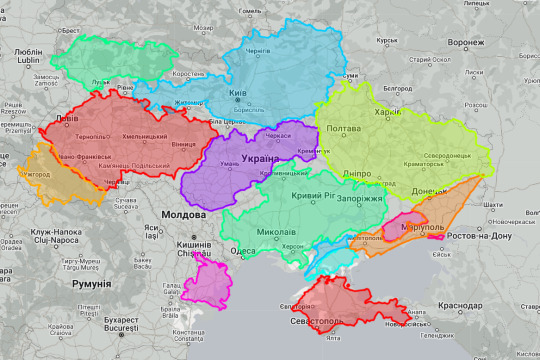
3 notes
·
View notes
Text
I have a bit of a bone to pick with the VLD fandom. If you'll allow me a bit of a rant:
In most, if not all, fics I've read, when Voltron arrives at a new planet they meet with The King or The Queen or one royal family. Why?
(I can't figure out how to make a cut on the app. Imagine this is it.)
On Earth we don't have one set/couple/family of rulers, and if there was one person to declare themselves king/queen we would revolt. We've done it in the past. Hell, most of Great Britain's history is about power grabs for the crown than ended in war/revolution/coup, you name it. So why are we assuming collectively that whatever planet Voltron lands on will have one monarchy to rule over the whole thing? Is such a thing even logistically possible?
Why is it a monarchy? We on Earth haven't had a monarchy that's held actual power for at least a century, I think (correct me if I'm wrong). Why would they? And only one at that? Why not a parliament, kind of like we see at the beginning of Lilo and Stich? Why not show that some parts of the planet have a monarchy, while others have democracy, while others have locally oppressive dictatorships, like we do on Earth?
It just makes no sense to me, and bothers me greately, that there is only one form of government in the whole a$$ planet, and that everyone there, unanimously, are happy with it and agree with its decision to join the coalition. Oh, and did I mention that in these kind of fics the only diplomatic functions we see are balls where whatever ship is front and center can dance and have A Moment? And then BOOM! The aliens join the coallition? Because Lance and Keith kissed and the aliens are suckers for gay romance??
That's not how diplomacy works! In order to understand how crucial and delicate deplomacy really is, let's look at the sh*t show that led to World War I: Germany, the US, France and Austria had multiple diplomatic meetings following the shooting of the Archduke Ferdinand. Germany demanded from the Serbians, I think, extremeley harsh methods of retribution to make up for the assassination, including, if I'm not mistaken, land concessions and a declaration that Serbia would be subservient to Germany. The Serbian government couldn't really do that, and they told Germany so, but Germany threatened to go to war if Serbia didn't comply. And they did. And then World War I led to World War II, which led to the Cold War, which had long reaching ramifications that affect us to this day, such as the rise and fall of the Soviet Union and Comunism, the adoption of Comunism in Cuba, North Korea and other countries that today struggle, the Vietnam War, which according to my husband happened because the US couldn't stand and allow a communist regime in Vietnam, or something like that.
Even today, diplomacy is a very thin tight rope. Look at the NATO renewal agreements that haven't been reached yet, and that if they don't, could mean another Cold War as countries arm themselves to the teeth with nuclear weapons.
Why do we think a whole a$$ planet full of aliens would be any different? Imagine what WE would do, on Earth, if this monstrous machine called Voltron came down from space one day and claimed to be Defenders of the Universe and they'd like an audience with Earth's leaders??? Who would we send? Obama? Trump? Biden? What about someone who isn't American? Maybe a Brit? A French? Maybe someone from Africa or Australia? The UN? Believe me, just trying to decide who would meet or host with Voltron would stretch diplomacy to its limits and could ruffle many feathers or many world leaders which could lead to conflict.
If you've read this far, thank you. I don't want any beef with anyone. I only used Klance as an example but this is a trope repeated throughout, regardless of the ship. I know I'm nitpicking. I know it's a TV show for kids. I know these things don't matter to most people. I just wanted to let that out there as a point of conversation, and maybe to inspire fanfic writers to think outside the box. Bye.
#voltron#voltron legendary defender#lance mclain#keith kogane#takashi shirogane#hunk garrett#pidge holt#princess allura#fanfic writing#fanfic authors#fanfic tropes
7 notes
·
View notes
Text
I really don't want to do this, but I think I have to.
If you want a song that fits Confrontation and Collusion (or even Revolution) , may I suggest you listen to Beogradski Sindikat.
Welcome to Serbia (English sub available)
Sistem te laže (my favorite) (English sub available)
Balada disidenta (also my favorite) (English translation is available on Spotify)
Oni su
I think there's more, but you can search for it on YouTube and listen to yourself.
Yeah, I know it's in Serbian, but I think these songs fit the environment of the episodes.
#miraculous ladybug#miraculous#ml season 5#mlb#miraculous ladybug season 5#ml confrontation#ml collusion
2 notes
·
View notes
Text
The history about the people who imposed communism isn’t a joke. Why does the modern history classes in our schools, start with the teaching that the assassination of Archduke Franz Ferdinand by a Serbian group, the Black Hand caused WWI, skip the war then the bolshevik revolution and the slaughter of 60 million ethnic Russian and Ukrainian civilians Christian men women and children, not during war but starved tortured and killed, by Trotsky and Lenin’s bolsheviks, going straight to WWII? We’re the 60 million less important? Why whenever the atrocities of the Soviet Union are brought up, we only hear about Stalin, whose rule in the USSR didn’t start til 1929. The Soviet Union started in 1917, Trotsky and Lenin were in charge til 1924 when Lenin died, Trotsky clung to power til Stalin took it away from him and had him deported to Mexico. The same people who demanded the truth be censored about the brutality of the bolsheviks and the worst of the fascistic Soviet Union, are the same people who demand Americans be censored and our rights be trampled.

History is repeating itself again but done in a Saul Alinsky way.
Trump screwed up those plans for four years.
It's how to boil a frog. If you do it slowly, you'll kill the frog. Now, the globalists are in a hurry, and people are waking up. That's heating up the frog too fast, and people jump out of the hot water.
We, the people, have to stay vigilant and counter every move they make.
They think they are the Gods, and we must bow to them. Let's not make that happen. Ignore distractions.
They are dividing us for a reason. Our survival depends on standing united against these liars.
We are being handed to China on a silver platter.
Watch the Vernon Coleman video. If that doesn't scare the shit out of you, I don't know what will.
Thank you for your ask!
Love, JD 😜💋
11 notes
·
View notes